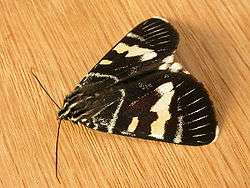Phalaenoides glycinae
| Australian Grapevine Moth | |
|---|---|
 | |
| Scientific classification | |
| Kingdom: | Animalia |
| Phylum: | Arthropoda |
| Class: | Insecta |
| Order: | Lepidoptera |
| Family: | Noctuidae |
| Genus: | Phalaenoides |
| Species: | P. glycinae |
| Binomial name | |
| Phalaenoides glycinae Lewin, 1805 | |
| Synonyms | |
| |
The Australian grapevine moth (Phalaenoides glycinae) is a moth of the Noctuidae family. It is endemic to the south-eastern half of Australia, but is an invasive species in many parts of the world, including Canada and South Africa.
The wingspan is about 50 mm.[1]
The larvae mainly feed on Parthenocissus quinquefolia, Hibbertia obtusifolia, Amyema gaudichaudii, Epilobium ciliatum, Fuchsia and Oenothera species, but mainly Vitis vinifera, hence it is considered a pest.
The Indian myna (Acridotheres tristis) was introduced into Australia in 1862 to deal with a number of insect pests including the grapevine moth. In this it was unsuccessful, and ironically the bird is now itself considered a pest in many parts of Australia.
Gallery
 Female, dorsal view
Female, dorsal view Female, ventral view
Female, ventral view Male, dorsal view
Male, dorsal view Male, ventral view
Male, ventral view
References
- ↑ Don Herbison-Evans & Stella Crossley (May 25, 2008). "Phalaenoides glycinae". uts.edu.au. Archived from the original on 2008-08-03. Retrieved 2009-01-23.
This article is issued from Wikipedia - version of the 12/3/2014. The text is available under the Creative Commons Attribution/Share Alike but additional terms may apply for the media files.